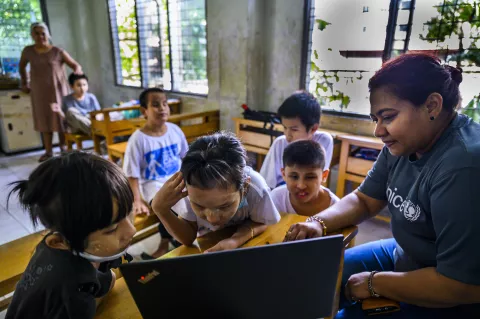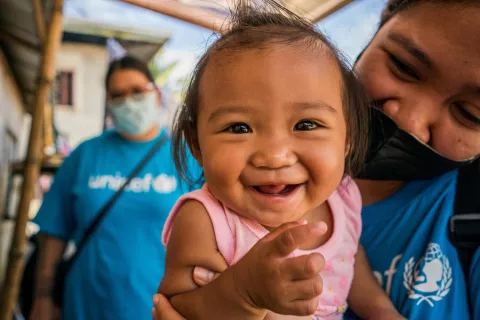Transformation in Tajikistan: ‘Baby Homes’ become family-based support centres
UNICEF is working with partners to protect young children from the damaging impacts of institutionalization.

ISTARAVSHAN, Tajikistan – It’s early morning and mothers and their children are arriving at the Family and Child Support Centre for young children from vulnerable families. Waiting inside are social workers who are getting ready to welcome the children.
In no time at all, the children are busy playing, reading and exercising. One of them is Dilnoza, 6, who has been visiting the centre for the past six months. Dilnoza was admitted after being diagnosed with cerebral palsy. Specialists at the centre found that her muscles were poorly developed, that she had limited mobility in her left arm and leg, and that her speech was not as advanced as is usual for a child her age.

But after only a few months of rehabilitation at the centre, Dilnoza’s speech improved and she also had better muscle movement, allowing her to do things like hold a spoon, eat and dress independently, and play some new games.

The centre in Istaravshan is one of four converted residential childcare institutions, known as Baby Homes in Tajikistan. With UNICEF’s support, the spaces have been transformed into family centres where vulnerable children can access community and family-based support without being institutionalized. Social services provided in the centres help to identify vulnerable families as well as developmental delays and disabilities among young children, allowing for early interventions. Most important, the centres provide vulnerable children with a safe and protective family environment.

Abdukholik, 3, has also been attending the centre. Abdukholik’s father is often away from home because of work, so he shares a room with his mother and several members of their extended family. It’s a challenging situation for Abdukholik, who was diagnosed with delayed psycho-verbal development, which has contributed to his under-developed speech and has meant that he struggles to concentrate.

After his diagnosis, Abdukholik’s mother saw a brochure about the Family and Child Support Centre and decided to bring him here. With just a few weeks of speech and communication therapy, Abdukholik’s speech improved. His vocabulary also expanded, and he learned to pay more attention. He also became more sociable and started playing more with other children.

“Social interaction is as important as stimulation like games and exercises for a child to grow to the fullest of his/her potential,” says Umeda Ergasheva, Director of Khayot dar oila (Life in a Family), a UNICEF partner.
From ‘Baby Homes’ to Family and Child Support Centres
Children placed in institutions are often deprived of social, emotional, and intellectual stimulation, and they are particularly vulnerable to violence, neglect, and abuse. The younger the child, the more profound the damage to a developing mind.
“I feel the children are looking at me and literally counting my steps as I leave,” says Salohiddin Shamsiddinov, a UNICEF Child Protection Officer, describing his experience visiting Baby Homes. “Every child needs attention, love, care and family.”

Since 2017, UNICEF has been working closely with the Government of Tajikistan to promote family-based care for children, including helping to transform the system of residential childcare institutions. In 2018, for example, the Government ordered that four Baby Homes – in Dushanbe, Istaravshan and Khujand – be converted into Family and Child Support Centres. In 2021, the President of the Republic of Tajikistan was among those attending the opening of the centre in Istaravshan.
“I believe that children deserve a good start in their lives, and our systems should be responsive to their needs,” says Aziza Rahmatova, former head of the Health Ministry’s Mother and Child Health Unit. In addition to the support centres initiative, the Government has also introduced a range of social services for children with disabilities and their parents, including a focus on intervention and rehabilitation; daycare for children of working parents with no other access to caregivers; ‘Give a mom a break’ services for parents of children who need care around the clock; and temporary shelters for mothers with young children in crisis life situations.
Protective family environments for every child
The transformation of Baby Homes into Family Child Support Centres has the potential to be replicated with other types of residential childcare institutions such as boarding schools. UNICEF also plans to work with institutions for children with disabilities to find ways to turn them into supportive and safe environments that meet the needs of children, in addition to continuing to work with the Government on a broad range of services for community- and family-based support to prevent children from being placed in residential childcare institutions in the first place.

Kouysinoy Maksoudova, Early Childhood Development Officer at UNICEF in Tajikistan, welcomes the moves away from residential institutions, adding that the Baby Homes weren’t responsive enough to children’s individual needs. “Babies there are not getting the required responsive care. They aren’t hugged and kissed enough. They are not sung lullabies.”
The Family Child Support Centres initiative was supported by the European Union, which financed the ‘Putting Families First’ project.



